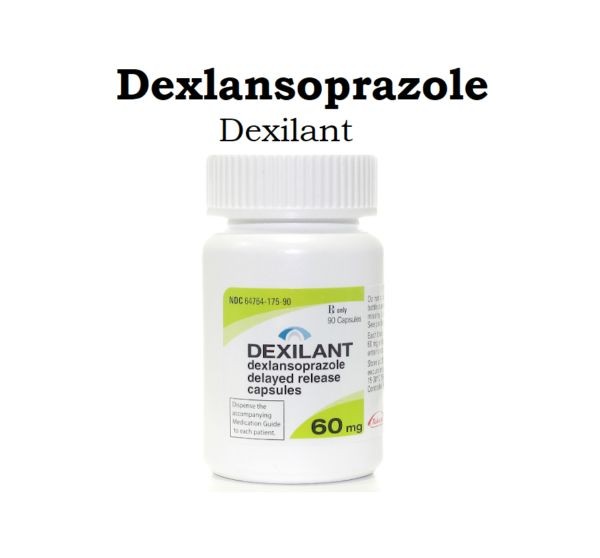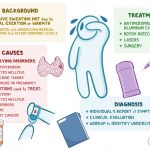
Contents
Dexilant (dexlansoprazole)
Dexilant is a prescription proton pump inhibitor (PPI) that reduces stomach acid.
Dexilant capsules are used in people 12 years of age and older:
- for up to 8 weeks to heal acid-related damage to the lining of the esophagus (erosive esophagitis or EE)
- for up to 6 months in adults and up to 16 weeks in children 12 to 17 years old to continue healing erosive esophagitis and relieving heartburn
- for 4 weeks to treat heartburn related to gastroesophageal reflux disease (GERD)
GERD occurs when stomach acid enters the esophagus, causing a burning feeling in the chest or throat, sour taste, or burping.
Dexilant’s safety and effectiveness in children under 12 years old are unknown.
Dexilant is not effective for GERD symptoms in children under 1 year old.
Side effects of Dexilant
While Dexilant may alleviate acid-related symptoms, it can still cause serious stomach issues. Consult your doctor.
Dexilant can result in serious side effects, including:
- Kidney problems (acute interstitial nephritis). Some individuals taking PPI medicines like Dexilant might develop acute interstitial nephritis, a kidney problem that can occur at any time. Seek immediate medical attention if you experience decreased urination or blood in your urine.
- Diarrhea. Dexilant may increase the risk of severe diarrhea caused by a certain intestinal infection (Clostridium difficile). Contact your doctor right away if you have watery stool, stomach pain, and persistent fever.
- Bone fractures. Long-term use of multiple daily doses of PPI medicines for a year or more could increase the risk of hip, wrist, or spine fractures. Take Dexilant as prescribed, at the lowest dose possible, and for the shortest necessary duration. Discuss your risk of bone fractures with your doctor when taking Dexilant.
- Types of lupus erythematosus. Some people using PPI medicines may develop certain types of lupus erythematosus or experience worsening of an existing condition. Seek medical help immediately if you have new or worsening joint pain or a sun-induced rash on your cheeks or arms.
- Vitamin B12 deficiency. Dexilant reduces stomach acid, which is essential for proper absorption of Vitamin B12. Talk to your doctor if you have been taking Dexilant for over 3 years to discuss the possibility of Vitamin B12 deficiency.
- Low magnesium levels. Prolonged use of PPI medicines for at least 3 months might lead to low magnesium levels. Low magnesium can be serious and may or may not present symptoms. Contact your doctor immediately if you experience seizures, dizziness, abnormal heartbeat, jitteriness, muscle weakness, spasms, cramps, or voice box spasms. Your doctor may check your magnesium levels before and during Dexilant treatment if it is long-term.
The most common side effects of Dexilant in adults include:
The most common side effects of Dexilant in children 12 to 17 years old include:
- headache
- stomach pain
- diarrhea
- inflammation (pain or swelling) in the mouth, nose, or throat
Other side effects may occur. Notify your doctor if you experience any bothersome or persistent side effects.
Serious allergic reactions may occur with Dexilant. If you experience symptoms such as a rash, face swelling, throat tightness, or difficulty breathing, discontinue Dexilant and seek medical attention.
Contact your doctor for medical advice regarding side effects. You may also report side effects to the FDA at 1-800-FDA-1088.
Dexilant dosage
- Take Dexilant as prescribed by your doctor.
- Do not change or stop your dose without consulting your doctor first. Dexilant capsules:
- Take Dexilant capsules with or without food.
- Swallow them whole, without chewing or opening the capsules.
- If swallowing the whole capsule is difficult, you can open it and mix the contents with applesauce. See the "Instructions for Use" in the Medication Guide for detailed instructions on taking Dexilant capsules with applesauce.
- Using an oral syringe or a nasogastric tube, you can mix the granules from the capsule with water. Refer to the "Instructions for Use" in the Medication Guide for detailed instructions.
Taking Dexilant capsules with applesauce:
- Place 1 tablespoon of applesauce into a clean container.
- Carefully open the capsule and sprinkle the granules onto the applesauce.
- Swallow the applesauce and granules immediately. Do not chew the granules or save the mixture for later use.
Giving Dexilant capsules with water using an oral syringe:
- Place 20 mL of water into a clean container.
- Carefully open the capsule and empty the granules into the water.
- Use an oral syringe to draw up the water and granule mixture.
- Gently swirl the oral syringe to prevent granule settling.
- Place the oral syringe tip in your mouth and administer the medicine immediately. Do not save the water and granule mixture.
- Refill the syringe with 10 mL of water, gently swirl, and administer any remaining medicine in the syringe.
- Repeat step 6.
Giving Dexilant capsules with water through a nasogastric tube:
If you have an NG tube that is size 16 French or larger, Dexilant may be given as follows:
- Place 20 mL of water into a clean container.
- Carefully open the capsule and empty the granules into the water.
- Use a 60 mL catheter-tip syringe to draw up the water and granule mixture.
- Gently swirl the catheter-tip syringe to prevent granule settling.
- Connect the catheter-tip syringe to the NG tube.
- Administer the mixture immediately through the NG tube into the stomach. Do not save the water and granule mixture.
- Refill the catheter-tip syringe with 10 mL of water, gently swirl, and flush the NG tube with the water.
- Repeat step 7.
Drug interactions with Dexilant
Tables 3 and 4 provide information on drugs with clinically important interactions when co-administered with Dexilant and instructions for managing them.
For further details on interactions with PPIs, consult the labels of concomitantly used drugs.
Table 3: Clinically Relevant Interactions Affecting Drugs Co-Administered with Dexilant and Interactions with Diagnostics
- Co-administration of dexlansoprazole with some antiretroviral drugs (e.g., rilpivirine, atazanavir, and nelfinavir) may decrease exposure, reducing antiviral effectiveness and promoting drug resistance.
- Some antiretroviral drugs (e.g., saquinavir) may exhibit increased exposure when used with dexlansoprazole, potentially increasing their toxicity.
- There are other antiretroviral drugs that do not present clinically significant interactions with dexlansoprazole.
Table 4: Clinically Relevant Interactions Affecting Dexilant When Co-Administered with Other Drugs and Substances
| CYP2C19 or CYP3A4 Inducers | |
| Clinical Impact: | Co-administration with strong inducers decreases dexlansoprazole exposure. |
| Intervention: | Avoid concomitant use of Dexilant with St. John’s Wort and rifampin. |
| Refer to prescribing information for ritonavir-containing products. | |
| CYP2C19 or CYP3A4 Inhibitors | |
| Clinical Impact: | Co-administration with strong inhibitors increases dexlansoprazole exposure. |
| Intervention: | Refer to prescribing information for voriconazole. |
Is Dexilant safe during pregnancy or breastfeeding?
Published observational studies on lansoprazole use did not demonstrate an association between adverse pregnancy-related outcomes and the drug. However, there are no studies available for dexlansoprazole use in pregnant women. Dexlansoprazole is the R-enantiomer of lansoprazole, and observational studies on lansoprazole use during pregnancy did not show adverse pregnancy-related outcomes.
There is no information on the presence of dexlansoprazole in human milk and its effects on breastfed infants or milk production. However, lansoprazole and its metabolites are present in rat milk. The benefits of breastfeeding should be considered alongside the mother’s clinical need for Dexilant and any potential effects on the breastfed child from Dexilant or the underlying maternal condition.
Summary
Dexilant (dexlansoprazole) is a prescription proton pump inhibitor (PPI) that reduces stomach acid.


